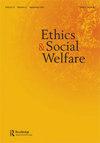Editorial
IF 0.9
Q4 SOCIAL WORK
引用次数: 0
Abstract
Research is an essential component of social justice, social welfare, community work, social policy, and social work. However, engaging in research processes inevitably brings up ethical complexities and challenges. From questions of power and privilege to issues of responsibility and relationships, ethical concerns permeate all stages of research. As researchers, we are constantly confronted with dilemmas and controversies that require us to make moral and ethical choices. In this special issue of Ethics and Social Welfare, we aim to promote exchange and discussion on issues, challenges, and problems arising from the conducting of research in these fields. Our goal is to explore the ethical dimensions of research in social justice, social welfare, community work, social policy, and related areas and to highlight the experiences, practices, and strategies that can help researchers conduct their work in a responsible and morally defensible manner. The ethical lens in research, we believe, must extend beyond legalistic and codified understanding of research ethics to address the socio-political embeddedness of ethical principles, and explore how research can serve as a means of providing knowledge, improving social justice, realizing human rights, and mobilizing social equality and inclusion. Researchers are social actors; their choices, decisions and conduct contribute to the generation and legitimation of knowledges and to the reproduction and/or transformation of existing social relations. This special issue was initiated to provide a meeting place of cultures, practices, practitioners, and research communities. In many cultures, the ‘meeting place’ is a sacred space where people gather to share stories, connect with each other, and learn from one another. In the context of this special issue, we use the metaphor of the meeting place to explore the intersection of ethics and research in social justice, social welfare, community work, social policy, and social work. Conducting research in these fields means engaging with complex ethical issues that require careful consideration and reflection. As practitioners and academics, we have a responsibility to ensure that our research is conducted in a responsible and morally defensible manner, while also adhering to relevant ethical principles. This special issue of Ethics and Social Welfare provides a platform for researchers to come together, share their experiences and challenges, and exchange strategies for conducting research that is grounded in ethical principles and values. Through this ‘meeting place’, we hope to build a community of practice that is committed to advancing research that is socially just, inclusive, and transformative. This meeting point of practice, ethics, discussions, and reflection is about an assembly of equals. It is a place to observe, listen, reflect, and celebrate. In creating this space, we have joined a variety of voices in the hope that what is shared may be amplified or acknowledged. In application, this special issue brings together a variety of article types: original articles, ‘ethics in practice’ articles, book reviews, and an extended discussion and commentary of a book review by the authors. Like the meeting places of many peoples, each brings their own concept of need or significance, each brings away what is necessary or interesting.编辑
研究是社会正义、社会福利、社区工作、社会政策和社会工作的重要组成部分。然而,参与研究过程不可避免地会带来伦理复杂性和挑战。从权力和特权问题到责任和关系问题,伦理问题渗透到研究的各个阶段。作为研究人员,我们经常面临困境和争议,需要我们做出道德和伦理选择。在本期《伦理与社会福利》特刊中,我们旨在促进对这些领域研究中出现的问题、挑战和问题的交流和讨论。我们的目标是探索社会正义、社会福利、社区工作、社会政策和相关领域研究的伦理层面,并强调可以帮助研究人员以负责任和道德辩护的方式开展工作的经验、实践和策略。我们认为,研究中的伦理视角必须超越对研究伦理的法律和成文理解,以解决伦理原则的社会政治嵌入问题,并探索研究如何作为提供知识、改善社会正义、实现人权以及动员社会平等和包容的手段。研究人员是社会行动者;他们的选择、决定和行为有助于知识的产生和合法化,有助于现有社会关系的再生产和/或转变。这期特刊旨在为文化、实践、从业者和研究社区提供一个聚会场所。在许多文化中,“聚会场所”是一个神圣的空间,人们聚集在这里分享故事,相互联系,相互学习。在本期特刊的背景下,我们用会议地点的隐喻来探索伦理与研究在社会正义、社会福利、社区工作、社会政策和社会工作中的交叉点。在这些领域进行研究意味着涉及需要仔细考虑和思考的复杂伦理问题。作为从业者和学者,我们有责任确保我们的研究以负责任和道德辩护的方式进行,同时遵守相关的伦理原则。这期《伦理与社会福利》特刊为研究人员提供了一个平台,让他们聚在一起,分享他们的经验和挑战,并交流基于伦理原则和价值观的研究策略。通过这个“聚会场所”,我们希望建立一个致力于推进社会公正、包容性和变革性研究的实践社区。这个实践、伦理、讨论和反思的交汇点是关于平等集会的。这是一个观察、倾听、反思和庆祝的地方。在创造这个空间的过程中,我们加入了各种各样的声音,希望共享的东西能够被放大或承认。在应用方面,这期特刊汇集了各种文章类型:原创文章、“实践中的道德”文章、书评,以及作者对书评的扩展讨论和评论。就像许多人的聚会场所一样,每个人都带来了自己的需求或意义概念,每个人带来了必要或有趣的东西。
本文章由计算机程序翻译,如有差异,请以英文原文为准。
求助全文
约1分钟内获得全文
求助全文
来源期刊

Ethics and Social Welfare
SOCIAL WORK-
CiteScore
1.60
自引率
20.00%
发文量
36
期刊介绍:
Ethics and Social Welfare publishes articles of a critical and reflective nature concerned with the ethical issues surrounding social welfare practice and policy. It has a particular focus on social work (including practice with individuals, families and small groups), social care, youth and community work and related professions. The aim of the journal is to encourage dialogue and debate across social, intercultural and international boundaries on the serious ethical issues relating to professional interventions into social life. Through this we hope to contribute towards deepening understandings and further ethical practice in the field of social welfare. The journal welcomes material in a variety of formats, including high quality peer-reviewed academic papers, reflections, debates and commentaries on policy and practice, book reviews and review articles. We actively encourage a diverse range of contributions from academic and field practitioners, voluntary workers, service users, carers and people bringing the perspectives of oppressed groups. Contributions might include reports on research studies on the influence of values and ethics in social welfare practice, education and organisational structures, theoretical papers discussing the evolution of social welfare values and ethics, linked to contemporary philosophical, social and ethical thought, accounts of ethical issues, problems and dilemmas in practice, and reflections on the ethics and values of policy and organisational development. The journal aims for the highest standards in its published material. All material submitted to the journal is subject to a process of assessment and evaluation through the Editors and through peer review.
 求助内容:
求助内容: 应助结果提醒方式:
应助结果提醒方式:


